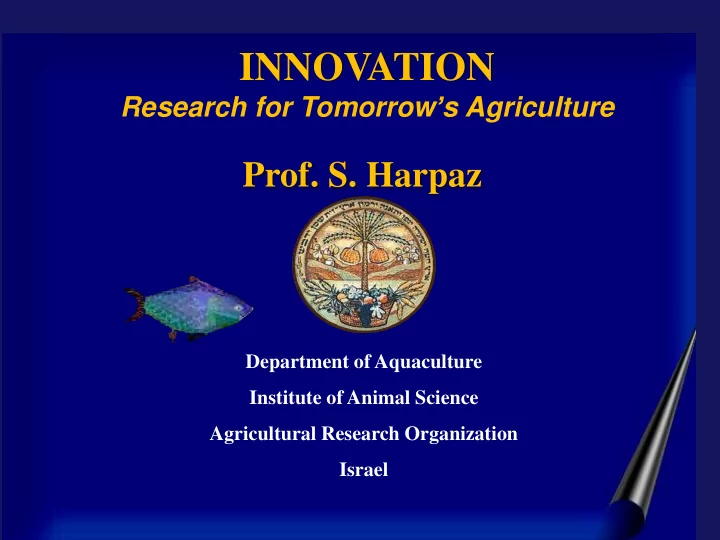

INNOVATION Research for Tomorrow ’ s Agriculture Prof. S. Harpaz Department of Aquaculture Institute of Animal Science Agricultural Research Organization Israel
2
Necessity is the mother of invention
Drip Irrigation 4
Des eser ert: : past t and nd pre resent sent 1959 1979 1999
Desert Aquaculture
R&D - Potential extension of Water Resources Irrigation technologies, purification and recycling, desalination Marginal water - saline and brackish water Waste water treatment technologies and recycling Desalination technologies Water saving: drip irrigation Regular -Irrigation improved irrigation practices, precision agriculture, leak Over-Irrigation prevention.
Shading with different color nets
Effects of blue or yellow nets on lupine
Market directed breeding Taste Yield Shelf life & Nutritional appearance quality <1970 ’ 1980 ’ 1990 ’ 2010 ’ >
Development of Functional Tomatoes Major goal: Develop elite, fresh market tomato cultivars possessing fruits enriched with key functional metabolites: carotenoids (mainly lycopene), Vitamins C and E, flavonoid compounds
Noteworthy Achievements: Breeding and introducing elite high pigment to fresh-market tomato cultivars. Identification of genes and gene interactions contributing to increased nutritional quality in fruits and vegetables.
Genomic selection in the Israeli dairy cattle The use of genetic markers to increase rates of genetic progress in breeding programs Cows with potential for high yields of milk have been bred – development of special feeding equipment and automatic milking – has led to saving in manpower and hygienic. The Israeli cow gives an average of 11,681 kg of milk per year, sign gnif ific icantl antly outpac pacing ing every nation in the world. Genotyping with BovineSNP50
Increasing Animal Welfare ARO Cooling System • Saves 8%-10% on infrastructure • Saves 20% on energy costs.
Commercial implementation subject to EU regulations
In 2016 200
Innovation/Sophistication in Postharvest Practices in Israel New technology New storage technology Sophisticated produce
Grain Storage Technologies in Israel As a result of efficient monitoring, intensive R&D of innovative methodologies and technologies, grain losses in Israel do not reach levels higher than 0.5% .
Recommend
More recommend